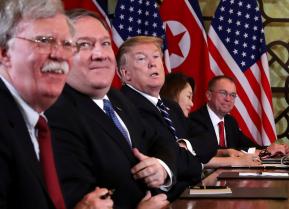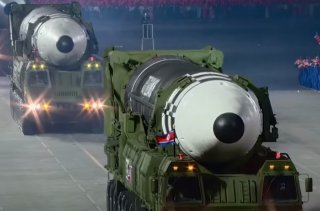What North Korea Wants from Joe Biden
And what will Kim do to try and meet his goal? Is an ICBM test, for example, in the offing?
With appropriate humility, we can make a few general, reasonable presumptions about how the Democratic People’s Republic of Korea (DPRK) regime thinks about its policy toward America in late 2020.
Pyongyang has several grievances it wants addressed by the United States. The most pressing of these is a demand that Washington lift economic sanctions against the DPRK. Months of North Korean diplomacy toward the United States during the Trump Administration culminated in Kim focusing on sanctions relief, even though Kim could have chosen to pursue other goals such as stopping U.S.-South Korea military exercises or getting U.S. troops off the Peninsula. Kim proposed broad sanctions relief in exchange for the closure of some of the facilities at the Yongbyon complex, which the Trump team rejected. Sanctions relief is presumably still the top priority in Pyongyang’s relations with Washington. Although China and Russia have gone back to helping the DPRK evade sanctions, the North Korean economy has suffered badly during 2020 as the country shut its cross-border trade with leading economic partner China in an attempt to protect itself from the pandemic.
Pyongyang tends to carry out acts the U.S. government considers “provocations” within a few months of U.S. presidential and midterm elections, supporting the idea that the North Korean government is likely to demand attention from the incoming Biden Administration by raising tensions on the Peninsula. In cases where the North Korean government decides it needs to take an action for technical or practical reasons, and that action is likely to alarm Seoul and Washington, Pyongyang often times the action to achieve a greater political effect.
The Kim regime is surely disappointed that Biden is replacing Trump. The Biden campaign did not list de-nuclearizing North Korea as a priority issue. Furthermore, Biden has signaled that his approach toward North Korea will be different from Trump’s in four major respects.
First, Biden said he will only agree to a summit meeting if Kim first agrees to reduce his nuclear weapons capability. Trump met with Kim three times without gaining any reduction in North Korea’s inventories of missiles, nuclear bombs or fissile material.
Second, Biden calls Kim “a thug” and criticizes Trump for calling Kim “his good buddy.” This indicates the apparent favorable personal relationship Kim had with Trump will not carry over into the Biden Administration.
Third, Biden acknowledges that North Korea has improved its missile capabilities since Kim’s first meeting with Trump. This means Biden does not give Pyongyang a pass on its flight tests of short and medium-range missiles, as Trump did.
Fourth, Biden will insist that thorough staff work by officials on both sides achieve a detailed agreement prior to a summit meeting, denying Kim the possibility of a relatively easy win by negotiating directly with his U.S. counterpart.
Biden’s comments about the DPRK leadership have already made a bad impression. North Korean state media have called Biden “reckless and senseless,” “a fool of low IQ” and an “imbecile bereft of elementary quality as a human being,” and a “rabid dog” in “the final stage of dementia” that “must be beaten to death with a stick.”
The views of Biden’s foreign policy advisors suggest a stalemate in US-DPRK relations will continue, with the North Koreans keeping their missiles and nuclear weapons while Washington maintains economic sanctions and refuses to officially recognize North Korea as a nuclear weapons state. Biden gives Kim and his brain trust every reason to believe they will need to press heavily and noisily to have a chance of getting satisfaction from the incoming US administration.
These observations support an expectation that the DPRK government will make a gesture to grab US attention near or shortly after Biden’s inauguration, with the objective of restarting talks about dropping U.S. economic sanctions.
Another North Korean peace offensive, akin to the outreach that began in early 2018, is theoretically possible, but after that experience, Washington would be far more skeptical about Kim saying he wants peace.
More likely is a bellicose gesture. But which kind?
Another nuclear bomb test has significant drawbacks from the regime’s standpoint. Patron China strongly disapproves of these tests. Moreover, the usual test site at Punggye-ri is heavily stressed from previous tests, and outside analysts warn there is a danger that additional explosions could cause the mountain above the testing tunnels to collapse, resulting in a large amount of radiation escaping into the atmosphere. Even if Kim could cope with the domestic impact of such a disaster, he would face a more difficult reckoning with Beijing. The border with China is only 50 miles from Punggye-ri, and the Chinese are already worried about radioactive fallout from North Korea.
Limited military actions against South Korea have also become problematic for the Kim regime. Larger attacks will invite disproportionate counter-attacks by the South Korean military, which are likely to embarrass Pyongyang. Smaller attacks, such as incidents in the disputed maritime territory in the West Sea (Yellow Sea), lack the weight to drive policy changes. In the last significant North Korean attempt to use military coercion against the South, Seoul ignored the threat and Pyongyang backed down.
That brings us to the possibility of the DPRK flight-testing a long-range missile. The DPRK has suspended intercontinental missile test launches since 2018. The Trump administration pointed to this moratorium as the main evidence of the success of its North Korea policy. North Korean technicians are likely hankering for more tests to provide data for upgrading their missiles. Kim’s government already warned in early 2020 that the moratorium is over. When Pyongyang showed off what appeared to be a new and bigger long-range missile at a military parade in October 2020, an international discussion ensued about whether the missile was real or a dummy mock-up, no doubt to Pyongyang’s dismay.
For these reasons, a practice ICBM launch is the most likely way Kim will greet the new president. This will mark the return of unfortunate normalcy to U.S.-North Korea relations, ending the fake rapprochement of the Trump years.
Denny Roy is a Senior Fellow at the East-West Center in Honolulu. Follow him on Twitter: @Denny_Roy808.
Image: KCNA Screenshot.


